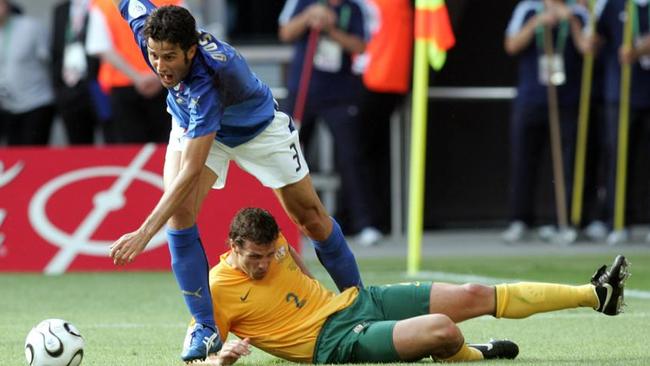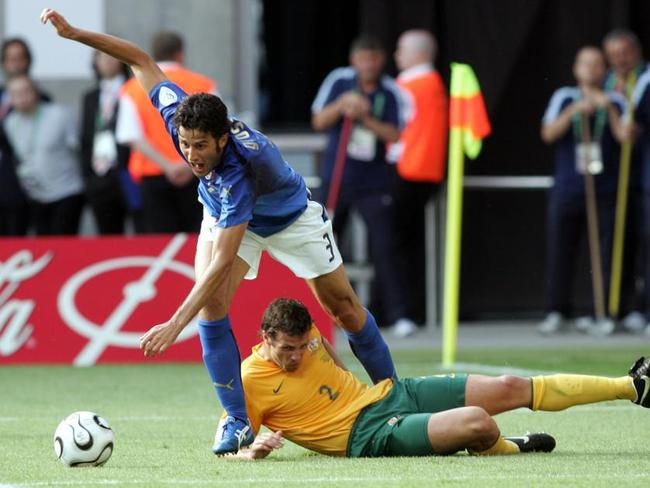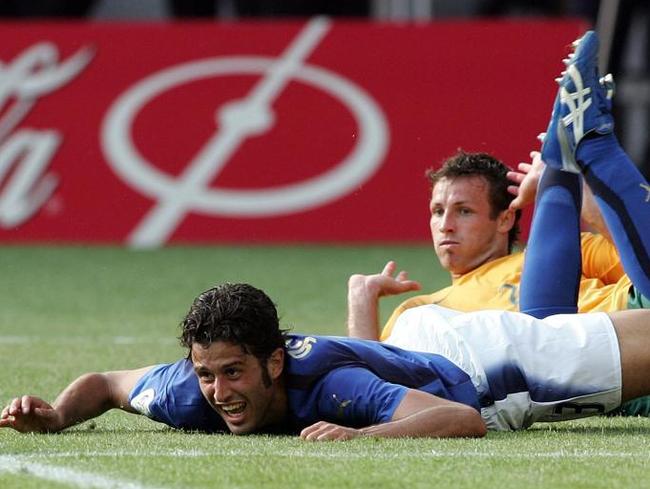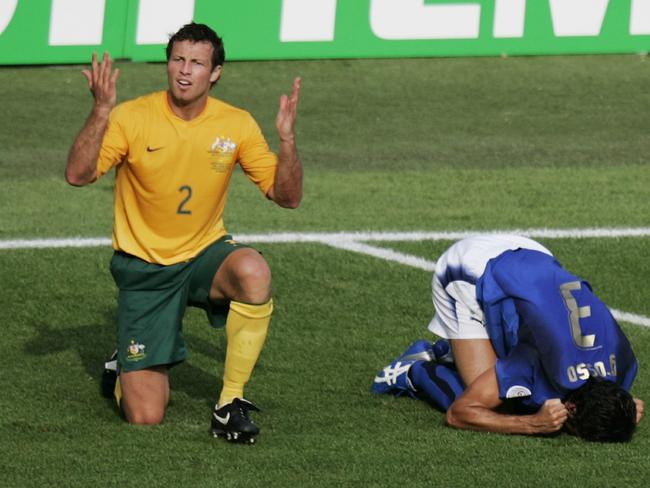Would infamous 2006 World Cup Fabio Grosso penalty that ended Socceroos run have been overturned in the era of VAR?
IT’s the most controversial moment in Australia’s World Cup history: Fabio Grosso went to ground, won a penalty and knocked the Soccceroos out. But what would be the result if it happened in the VAR era?

World Cup
Don't miss out on the headlines from World Cup. Followed categories will be added to My News.
“FABIO Grosso is into the box, Lucas Neill is across to challenge, and it’s a penalty to Italy in the last minute … but wait, the VAR is reviewing this. And the decision has been overturned!”
Twelve years ago, Australia’s World Cup adventure was brought to a crashing halt by referee Luis Medina Cantalejo — but would his decision, one that is still debated to this day, survive the scrutiny of the video referee?
The Socceroos were involved in the first decisive VAR call of Russia 2018 and just like the contention around Josh Risdon’s clash with Antoine Griezmann, the Neill-Grosso incident still polarises opinion.
WRAP: Tunisian tears and England’s bizarre bug threat
‘HIGH ALERT’: England hype train goes into overdrive
WATCH: Incredible footage as Saudi team plane catches fire mid-flight
FROM THE ARCHIVES: FABIO GROSSO GOES TO GROUND. WATCH THE VIDEO IN THE PLAYER BELOW...
The secretary of IFAB — world football’s laws of the game overlord — Lukas Brud — suggested that the penalty may have been overturned after video replays.
“It would definitely be reviewed. The error is also the definition of the referee because sometimes the referee might change the way he is officiating a specific match,’’ Brud said.
“A referee’s biggest (challenge) is to be consistent. In that particular incident, the VAR (would) tell him, clearly there was contact, but maybe you wouldn’t give a penalty if because in such an important match, I’m not sure I would give a penalty.
“Then the referee can look at it himself and review the situation. It has to be a clear and obvious error but sometimes this is also perception.

“So if the ref believes he saw a clear foul but then reviews the incident and says I saw something much different from what I’ve seen on TV, this can be a clear and obvious error for the referee because he has not seen it properly, or had a different perception.
“It’s very difficult to find a balance in what is a clear and obvious error. It’s for the referee himself to ensure in a crucial moment, the referee has taken the final decision according to the way he was officiating the game at the time.”

INSIDER: Denmark’s secret weapon in Socceroos’ battle
SAVIOURS: SBS steps in to save #Floptus debacle
TRANSFER: Euro clubs circling inspirational Sainsbury
A-League VAR panel member Strebre Delovski believes the decision would have stood under his interpretation.
“There’s been a lot of debate about the Lucas Neill incident and if there’s any debate involving the decision, then automatically the on-field decision should stand,’’ Delovski said.
“The VAR impact should be clear and obvious error. Would you say that’s a clear and obvious error? Probably not.
“Lucas Neill launched himself, you could argue either way so there’s some doubt, so VAR should not get involved. In my opinion the decision would have stood.”

Such instances could cause mayhem being so close to the whistle, especially if the referee dismissed a penalty appeal before overturning, although FIFA are believed to have instructed referees to avoid blowing the final whistle in such circumstances.
Had the referee waved play on, Delovski said that call should also have stood.
“Exactly the same. Whether he waved play on or blew a penalty, because there was doubt,’’ he said.
“The VAR should only get involved if it’s a clear and obvious error. In my opinion, if 20 people are in a room, all 20 have to say that’s clearly (wrong) for the decision to get overturned. If it’s 16-4, then the on-field decision should stand because there is a grey area.”
Winger Mile Sterjovski, who is in Russia as a mentor for the current squad, was the only player who came off, sacrificed for John Aloisi in the 81st minute.
“I was marking Grosso for most of the game because I was on the right wing. Then I came off and Bresh (Mark Bresciano) was on the right,’’ Sterjovski said.
“My thought, and I wouldn’t even (bring in) the VAR, I don’t understand why Lucas went to ground. It probably wasn’t a penalty but it kind of swayed the referee I guess. Maybe if he stayed on his feet it would’ve been a different ending.
“You have to give Italy credit because they did play with a man down for most of the game and we couldn’t break them down, so it’s hard to always go back and say was it a penalty or isn’t it?”
Fox Sports commentator Simon Hill said it was difficult to call that game, which Italy won in Kaiserslautern, and said it has the potential to overshadow Russia 2018.
“I thought it was a penalty in real time and 12 years later I haven’t seen anything that would change my mind,’’ Hill said.
“Sometimes it’s obvious, but a lot of the times it’s not. If you have sort of confusion in a World Cup semi-final or a final, for example involving maybe Argentina-Brazil, then you’re going to have serious problems — if the fans don’t know what’s going on.”
So would it have been overturned? Well, it’s debatable.


